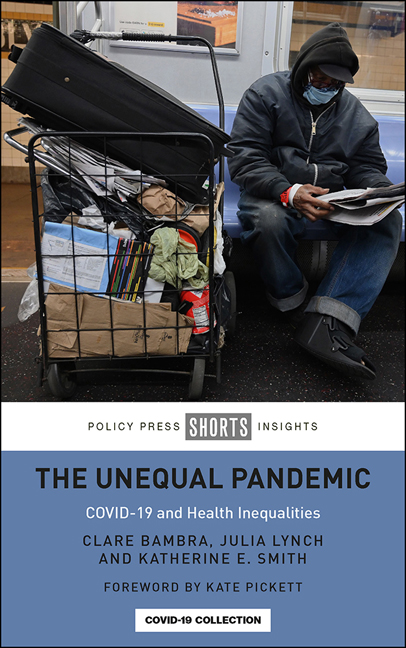Book contents
- Frontmatter
- Contents
- List of figures and tables
- About the authors
- Acknowledgements
- Foreword
- Preface
- one Introduction: perfect storm
- two Pale rider: pandemic inequalities
- three Collateral damage: inequalities in the lockdown
- four Pandemic precarity: inequalities in the economic crisis
- five Pandemic politics: inequality through public policy
- six Conclusion: health and inequality beyond COVID-19
- Notes
- References
- Index
six - Conclusion: health and inequality beyond COVID-19
Published online by Cambridge University Press: 04 January 2022
- Frontmatter
- Contents
- List of figures and tables
- About the authors
- Acknowledgements
- Foreword
- Preface
- one Introduction: perfect storm
- two Pale rider: pandemic inequalities
- three Collateral damage: inequalities in the lockdown
- four Pandemic precarity: inequalities in the economic crisis
- five Pandemic politics: inequality through public policy
- six Conclusion: health and inequality beyond COVID-19
- Notes
- References
- Index
Summary
‘Hope’ is the thing with feathers –
That perches in the soul –
And sings the tune without the words –
And never stops -at all -
Emily Dickinson, 1891Introduction
This book has documented the unequal impact of the COVID-19 pandemic. It has sought out the causes of the health inequalities that emerged from the pandemic, and located them in the syndemic of social inequality and the novel coronavirus. We have argued that the COVID-19 pandemic is unequal in four ways:
First, the pandemic is killing unequally (Chapter Two). In every country that has been affected by the pandemic, more people are ill, and there are more deaths from the disease, in the places where the most deprived people live. There are also significant inequalities across racial and ethnic groups. This is because of the interaction of the pandemic with existing social, economic and health inequalities.
Second, the pandemic is being experienced unequally (Chapter Three). Successive lockdowns designed to quickly halt the spread of COVID-19 when case numbers are rising rapidly have resulted in a significant increase in social isolation for nearly everyone; but the social and economic experiences of lockdowns have been unequal. Lower-income workers are more likely to experience job and income loss, live in higherrisk urban and overcrowded environments, and have higher exposure to the virus by occupying key worker roles.
Third, the pandemic is impoverishing unequally (Chapter Four). The pandemic has resulted in an unprecedented shock to the economy from which we have yet to emerge. Job losses, wage reductions, higher debt, and more poverty, as well as increases in the ‘deaths of despair’, are likely to follow, if previous economic downturns are any guide. However, the social and geographical distribution of these economic impacts will be unequal, with low-income workers, women and ethnic minorities once again bearing the brunt.
Fourth, the pandemic's inequalities are political (Chapter Five). The unequal impacts of COVID-19 were not inevitable: the pandemic was a predictable event, and the unequal effects could have been, and indeed in some countries were, mitigated or avoided through better preparation.
- Type
- Chapter
- Information
- The Unequal PandemicCOVID-19 and Health Inequalities, pp. 99 - 118Publisher: Bristol University PressPrint publication year: 2021



